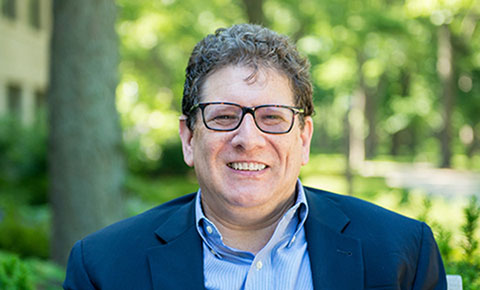Uttal Receives $1.3 Million to Study Spatial Thinking

Northwestern University psychologist David Uttal has received four grants worth $1.28 million to study new ways to enhance spatial thinking, the process of looking for patterns in the relationships between objects.
All four grants–three from the National Science Foundation and one from the Institute of Education Sciences– emphasize that spatial thinking is malleable and that “playful learning” is the best way to teach the skills, said Uttal, professor of education in the School of Education and Social Policy and professor of psychology.
“Children who do well at spatial tasks such as reading maps and assembling puzzles are more likely to excel in science, technology, engineering and mathematics (STEM),” Uttal said. “We know it’s important, but few people teach it. We're trying to change that.”'
Uttal runs the Spatial Intelligence & Learning Center at Northwestern where he studies how people interpret and use information about locations to solve problems.
Children as young as preschool can learn spatial thinking skills, Uttal said. In one analysis, he reviewed more than 200 studies that looked at spatial training in a variety of contexts–everything from playing video games, to designing dresses–anything that was spatially demanding.
“It responds to experience and training, to quite a substantial degree,” Uttal said. “Some studies have linked this malleability to some aspects of STEM achievement as well.”
Uttal teaches Mapping and Spatial Analysis for Social Issues, a course that explores using maps and mapping technologies to address issues of diversity, equity, inclusion, and access to fresh food or health care. Students learn to use Geographic Information Systems (GIS) to create maps to understand and analyze the problems and suggest solutions.
Read more about how Uttal will use the support from the National Science Foundation and Institute for Education Sciences:
Leveraging the Power of Reflection and Visual Representation in Middle-Schoolers’ Learning During and After an Informal Science Experience. ($458,000, National Science Foundation)
The research team will study how to harness the power of refection during learning experiences such as field trips. “Encouraging and engaging students in reflection often requires specific supports and prompts, Uttal said. “The students need to connect their questions with specific practices used by scientists.”
Uttal’s team will give approximately 3,000 middle school students participating in LabVenture, a 2.5 hour exploration of the Gulf of Maine ecosystem, a chance to reflect on their experience. Both during the field trip and later, at home, they’ll use the power and potential of graphs, drawing, charts, maps, and other visual representations to see if it helps them retain more of what they learned.
The project offers opportunities for undergraduate researchers as well as other units within the School of Education and Social Policy, including the Center for Talent Development and the Office of Community Education Partnerships, where Uttal will discuss the importance of spatial abilities for STEM learning with teachers.
Validity Evidence on the Spatial Ability Assessment for STEM Instruction and Evaluation ($399,492, Institute of Education Sciences)
Using a wide assortment of lab data and eye-tracking metrics, this four-year study will assess the Cognitive Abilities Test (CogAT): Spatial Assessment, to help determine the effectiveness of a program used to measure spatial reasoning for elementary and middle school students. The test was developed for grades 2 through 8, in collaboration with Riverside Insights and the digital design company Digital Artifacts.
Approximately 2,300 students between the ages of 7 and 14 will be recruited from urban, rural, and suburban school across the nation–Illinois, Alabama and Arkansas. The study will include a sample of 30 teachers—varying in gender, race, ethnicity, area of certification, and years of teaching experience
Using AI-enabled Smart Objects to Understand and Support Spatial Reasoning and Learning ($325,000, National Science Foundation)
In collaboration with Michigan State University computer engineer Subir Biswas, Uttal and his team will develop and test an artificial intelligence system that uses "smart blocks" to help children use spatial thinking skills. These devices gather data on the child’s interactions by tracking movement, acceleration, rotation, and how different objects are placed and handled with respect to each other.
After analyzing the youngsters’ building patterns, the researchers will use machine learning to suggest strategies to children as they build to see if this yields higher levels of spatial thinking. In addition to blocks, Uttal is adding “smartness” and internet connectivity to jigsaw puzzle pieces, children’s toys and everyday classroom/playroom objects
“Artificial intelligence should be a natural extension of play, not a replacement or substitution for it,” Uttal said. “Our vision marries the cognitive science of play and the opportunities for enhancing learning that comes with advances in artificial intelligence. We want to know how toys embedded with AI could augment, guide, and facilitate children’s play and learning.”
Synthesizing Research on Spatial Taxonomies ($98,858, National Science Foundation)
Spatial tests were originally designed for assigning recruits or draftees to military jobs. This series of workshops will help improve how spatial tests are used, how they relate to each other, and which abilities they measure.
The workshops will bring together researchers from cognitive science and psychometrics, produce a roadmap that summarizes the next steps in terms of research and development of spatial tests. They’ll also develop a consensus statement regarding what is known about spatial abilities, spatial tests, and their relation to STEM.